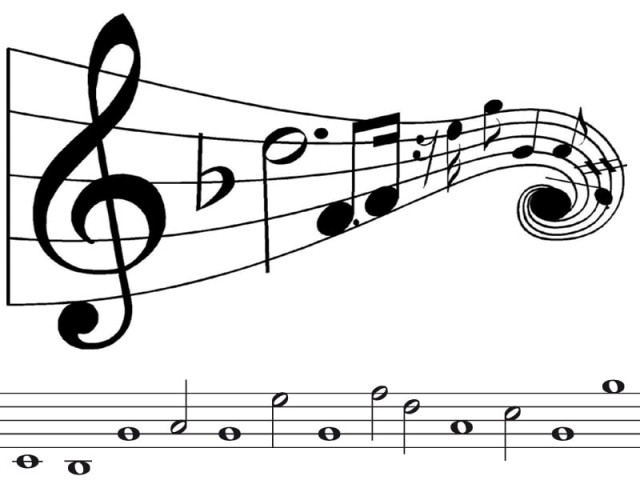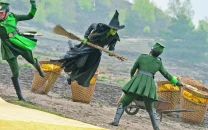Abdullah Chilli on the golden years
The lyricist talks about 30 years of producing hit numbers in the film industry.

The lyricist talks about 30 years
of producing hit numbers in the film industry. DESIGN: ASIF ALI
Pakistani poet and lyricist Abdullah Chilli gave his best years to the film industry from 1965 to the mid-‘90s. He is now over 65 years old and an institution for upcoming lyricists, with over 3,000 songs to his name.
“When I started out, the environment [of the industry] was such that a person would give all of himself to the industry, so people would feel proud of their work,” says Chilli, who kept himself grounded in an unstable film industry for more than 30 years.
“Our role was to show the dream inside of a film situation,” he adds. “There are a lot of songwriters in Pakistan, but the industry doesn’t introduce them. I remember when my songs started to become popular, every film director wanted to work with me.”
As a popular lyricist, Chilli was contracted by numerous film-makers in his golden era, but says he never felt overburdened by the work. Chilli describes song-writing as a talent different from book poetry. He explains that instead of penning down words when inspired, a lyricist creates a song based on a situation set by a director.
Why re-do classics?
Many of Chilli’s songs have been sung over and over again, without giving any due credit to him. But this doesn’t deter him — he continues to work with leading artists, such as Sahir Ali Bagga, Arshad Mehmood and more. He feels the same about old classic songs sung by Indian legendary singers. “If Kishore or Rafi sang them, there was no point in having them re-done,” says Chilli. “Why don’t singers ask us to do something new instead?”

He recalls a time when late legendary singer Madame Noor Jahan, who lent her voice for almost 300 songs written by him, commented on re-makes of classic songs. After listening to an album of her songs covered by Maratib Ali Khan, Chilli says she was bewildered that they had been re-done. “She asked Khan, ‘My child, did I sing all of them that bad that you had to sing them again?’,” Chilli recalls.
Chilli blames his decision to quit the industry on moral apprehensions related to the increase in vulgar songs. “Cinema was never an industry in Pakistan,” he says.
The veteran lyricist also shares that his first film as producer Yeh Adam — a social critique on Lahore’s Heera Mandi — was banned for several years before it was released. The film went on to win the National Film Award. Though the film took four years to release due to the strict censoring policy, Yeh Adam is particularly close to Chilli because one of the film’s songs received memorable feedback. M Javed had played the song on Radio Pakistan, and the esteemed poet Munir Niazi had given Chilli positive feedback.
“Niazi asked Javed who the writer was because it had touched chords which he had never thought of,” says Chilli.
The golden days might have passed Chilli by, but he feels immense pride in knowing that he never had to be a sell-out. He left the film industry when he thought it was right and began working on private albums for artists such as Nusrat Fateh Ali Khan, Alam Lohar and Attaullah Esakhelvi.
Meanwhile, he is a part of an upcoming project Dunya, starring Moammar Rana and Jan Rambo. The story that he wrote revolves around the treatment of Khwaja Siras.
Chilli’s popular songs
Mera Tan Man Pyasa Vay sung by Noor Jehan (1986)
Guru Mangta Pya sung by Noor Jahan (1992)
Allah Allah Haq Allah Hu sung by Alam Lohar (1981)
Ankh Kehti Meri Husne sung by Arshad Mehmood (2004)
Published in The Express Tribune, April 16th, 2013.
Like Life & Style on Facebook for the latest in fashion, gossip and entertainment.



















COMMENTS
Comments are moderated and generally will be posted if they are on-topic and not abusive.
For more information, please see our Comments FAQ